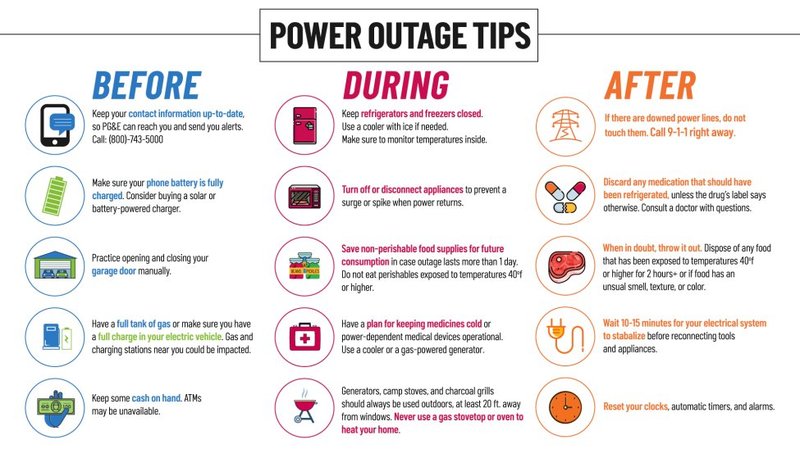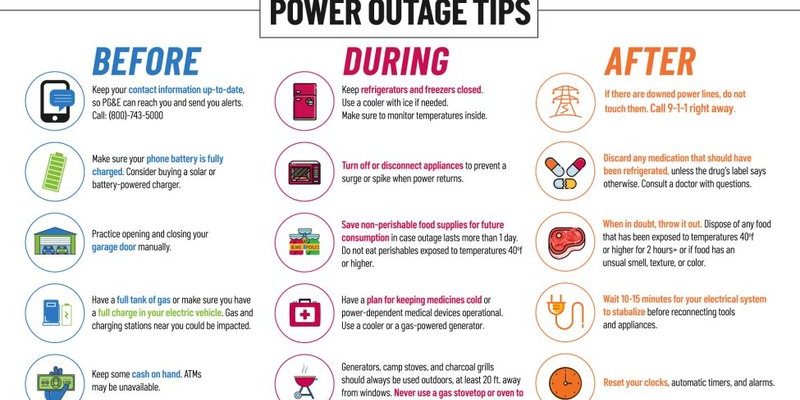
Let’s face it, most of us only think about power until it’s gone. It’s easy to take those blinking Wi-Fi routers and humming refrigerators for granted. But when APS or SRP (the major power providers around Phoenix) have an outage—whether from big storms, heatwaves overloading the system, or just a blown transformer—everyone scrambles to remember what to do. Don’t worry if you’re feeling a little lost: here’s a simple, step-by-step guide for handling a power outage in zip code 85001, with some realistic advice, a few pro tips, and a little clarity in the chaos.
First Things First: Stay Calm and Check What’s Happening
Honestly, the first reaction when the power blinks out—especially if it’s sudden—is a mix of “Whoa, what happened?” and “Now what?” It’s easy to panic, but the best move is to take a deep breath and assess the situation. Sometimes, it’s just your house. Other times, it’s the whole block or city.
- Check if it’s just you. Look outside—are streetlights on? Are neighbors’ lights out too? This helps you know if it’s a big outage or just a tripped breaker in your own home.
- Flip the breakers. If you’re the only one in the dark, head to your circuit breaker box and see if any switches are out of sync. Reset them if needed.
- Grab your phone (while it’s still got battery). Search for outage maps from APS or SRP, or use their mobile apps. These will show if your zip code 85001 area is listed in a current outage and give updates about restoration times.
If there’s a storm raging or the whole neighborhood is dark, it’s likely a larger issue. But knowing for sure helps you decide your next steps.
Contact Your Utility Provider and Report the Outage
Here’s the thing: Power companies can’t fix what they don’t know about. If your area isn’t listed on the outage map, take a minute to report it. Both APS and SRP make it easy.
- Use the utility app or website. Log the outage right in the APS or SRP portal—this helps crews prioritize and troubleshoot faster.
- Call the hotline if you’re not tech-savvy or your phone’s browser isn’t working. Keep the number handy (APS: 602-371-3680, SRP: 602-236-8811).
- Don’t assume someone else will call. More reports = faster fixes.
Reporting the outage also helps you get updates pushed to your phone, so you’re not left guessing about restoration estimates. Nobody likes feeling powerless—literally and figuratively.
Stay Safe: Avoid Hazards During a Power Outage
Safety first, always—especially when the lights (and sometimes common sense) go out. Power outages can make even familiar spaces risky.
- Don’t use candles if you can avoid it. Flashlights or battery-powered lanterns are way safer—no risk of fire if you knock something over in the dark.
- Watch out for spoiled food. If the fridge is out for more than four hours, perishable items might be unsafe. Trust your nose—and if in doubt, toss it out.
- Avoid opening the fridge/freezer unless truly necessary. The colder you keep things, the longer your food and meds will last.
- Unplug electronics. A sudden power surge when the electricity snaps back on can fry your TV, computer, or even your universal remote. Leave one lamp plugged in so you’ll know when power returns, but keep the rest unplugged or on surge protectors.
If you have kids, pets, or elderly family at home, make sure everyone stays together and away from any potentially dangerous areas—especially outside near downed power lines.
Keeping Cool (or Warm) in the Phoenix Climate
Living in zip code 85001, you know just how quickly things can heat up—or on rare occasions, cool off. When the power’s down, so is your A/C or heater. That can turn an outage into an emergency, especially if it drags on.
- Close blinds and curtains. This keeps the sun’s heat out and your home cooler, longer. In winter (yes, Phoenix can get chilly!), do the opposite during daylight—let sun in for warmth, then trap it at night.
- Limit movement to the coolest rooms. Basements, if you have them, or interior spaces stay cooler. Avoid opening outside doors more than absolutely needed.
- If it’s dangerously hot, head to a designated cooling center. Phoenix has emergency shelters during heatwaves and major outages. Listen to local radio or check your city’s website for open locations.
During peak summer in 85001, a power outage can be more than uncomfortable—it can become truly dangerous. Don’t wait too long to make a plan if you feel yourself or others overheating.
Emergency Supplies: What Should Be Ready?
You might be wondering, “What’s in a real-world emergency kit, and do I actually need one?” The answer’s yes, and it’s not just about batteries for your universal remote.
- Flashlights and lanterns (with spare batteries, or even rechargeable with a hand crank or solar option).
- Battery packs for phones/device charging. These are lifesavers if the outage lasts all day. Remember to keep them topped up when things are normal.
- Bottled water and non-perishable snacks. Enough for every person (and pet!) for at least 24 hours.
- First aid kit, medications, and a list of important contacts.
- Manual can opener, cash, and important paperwork in a watertight bag.
- Your remotes and entertainment like books, puzzles, and activities that don’t need electricity. (Honestly, nothing pairs better with a power outage than a deck of cards or a favorite magazine.)
Checking your kit every few months makes sure batteries haven’t expired and snacks are still edible—because stale granola bars never make a crisis better.
Staying Connected: Communication Tips When the Power’s Out
Here’s a thought: When Wi-Fi dies and your phone’s battery is draining faster than ice cream in the Phoenix sun, staying in the loop is suddenly a real challenge.
- Save phone power by dimming your screen, closing apps, and turning on battery-saver mode.
- Use text, not voice. Texts use less battery and have a better chance of getting through if cell towers are overloaded.
- Keep a battery-powered or hand-crank radio handy. These old-school devices are vital for getting real-time updates. Bonus: Most models work even if your fancy remote or smartphone doesn’t sync with the situation.
- Have a pre-arranged check-in plan with family or friends. If you’re separated or have elderly neighbors, set times to text or call so everyone knows you’re okay.
If you use any medical equipment that relies on electricity, let your utility company know ahead of time. Most providers have a registry that prioritizes restoration or offers alternate solutions.
What To Do When Power Comes Back
That moment when the lights flicker on feels like a small miracle. But don’t rush—there are a few steps to take before you’re back to normal.
- Wait a minute before plugging everything in. If you’ve unplugged major electronics, plug them back in one at a time to avoid overloading your system.
- Check your appliances and electronics for any signs of trouble. If a remote, router, or other device refuses to sync, try a reset or fresh battery before assuming it’s toast.
- Inspect the fridge and freezer. Toss any food that feels warm or smells off—even if you hate wasting it. Food safety always wins over wishful thinking.
- Restock your emergency kit. Replace used up batteries, snacks, or water immediately—future you will thank present you.
If you notice lingering issues—like flickering lights, weird electrical smells, or appliances failing to work—call a local electrician. Don’t try DIY fixes on your home’s wiring after a major outage or surge.
Comparing Alternatives: Home Generators and Battery Backup
Living in 85001, you might start thinking about ways to stay powered up the next time the grid goes down. Home generators and backup batteries are popular, but what’s right for you?
- Portable generators can keep essentials (like your fridge or a medical device) running, but require careful use—never run gas-powered models inside or near open windows. Always follow the manufacturer’s safety and sync instructions.
- Whole-home standby generators kick in automatically during an outage, but they’re a bigger investment and require professional installation. They run on natural gas or propane, and can handle almost everything—including your beloved remotes and entertainment systems.
- Battery backup systems (like Tesla Powerwall or similar brands) store electricity from the grid or solar panels. These are quieter, have no emissions, and can be set to power certain circuits—perfect if you want to keep internet, lights, and fans going without the noise or fumes of a generator.
No matter what you choose, regular maintenance and testing—like syncing your remote with a new TV—are required to ensure it all works when you need it most.
When To Seek Help: Community Resources in 85001
Sometimes, a power outage is more than just an inconvenience. If you’re worried about your health, can’t keep your home livable, or the outage drags beyond a few hours, it’s smart—not weak—to reach out for help.
- City of Phoenix website and apps often list open community cooling or warming centers, updates on restoration progress, and tips for those with medical needs.
- Local radio and news stations give live updates (even when your internet is down).
- Check on neighbors, especially elderly or vulnerable folks. Sometimes, a knocked-out landline or disconnected universal remote is the first sign someone needs assistance.
If you ever feel unsafe—like during extreme heat, medical emergencies, or potential hazards from downed power lines—don’t hesitate to call 911 or seek shelter. Community is often your best backup when the grid goes down.
Wrapping Up: Being Prepared (and a Little Patient) Brings Peace of Mind
Here’s the truth: Nobody likes losing power, whether for five minutes or five hours. But when you know what to do during a power outage in zip code 85001, the whole experience feels less overwhelming—and much safer. Taking small steps to prepare, staying calm during the blackout, and checking in with your local power provider can make a huge difference. And who knows? Maybe the next time the lights go out, you’ll find yourself grabbing a flashlight, shuffling a deck of cards, and making the best of an unexpected break from the digital world. Stay ready, stay safe, and remember that a little planning goes a long way when the unexpected happens.
